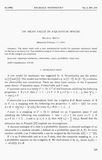Article
MSC:
03E72,
03G12,
04A72,
60A99,
81C20,
81P10 | MR 1052741 | Zbl 0719.60002 | DOI: 10.21136/AM.1990.104404
Full entry |
 PDF
(0.6 MB)
Feedback
PDF
(0.6 MB)
Feedback
 PDF
(0.6 MB)
Feedback
PDF
(0.6 MB)
Feedback
Keywords:
quantum mechanics; observables; states; probability; fuzzy sets; $F$-quantum space; indefinite integral of observables
quantum mechanics; observables; states; probability; fuzzy sets; $F$-quantum space; indefinite integral of observables
Summary:
The paper deals with a new mathematical model for quantum mechanics based on the fuzzy set theory [1]. The indefinite integral of observables is defined and some basic properties of the integral are examined.
References:
[1] B. Riečan: A new approach to some notions of statistical quantum mechanics. Busefal 36, 1988, 4-6.
[2] B. Riečan A. Dvurečenskij: On randomness and fuzziness. In: Progress in Fuzzy Sets in Europe, (Warszawa 1986), PAN, Warszawa 1988, 321-327.
[3] A. Dvurečenskij B. Riečan: On joint distribution of observables for F-quantum spaces. Fuzzy Sets and Systems. MR 1089012
[4] A. Dvurečenskij B. Riečan: Fuzziness and commensurability. Fasciculi Mathematici.
[5] A. Dvurečenskij F. Chovanec: Fuzzy quantum spaces and compatibility. Int. J. Theor. Phys. 27 (1988), 1069-1082. DOI 10.1007/BF00674352 | MR 0967421
[6] A. Tirpáková: On a sum of observables in F-quantum spaces and its applications to convergence theorems. In: Proc. of the First Winter School on Measure Theory (Liptovský Ján 1988), 68-76.
[7] A. Dvurečenskij A. Tirpáková: A note on a sum of observables in F-quantum spaces and its properties. Busefal 36 (1988), 132-137.
[8] A. Dvurečenskij A. Tirpáková: Sum of observables in fuzzy quantum soaces and convergence theorems.
[9] K. Piasecki: On the extension of fuzzy P-measure generated by outer measure. In: Proc. 2nd Napoli Meeting on the Mathematics of Fuzzy Systems 1985, 119-135.
[10] A. Dvurečenskij: The Radon-Nikodým theorem for fuzzy probability spaces.

